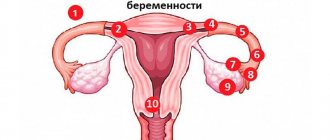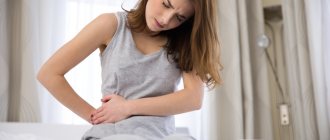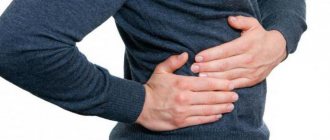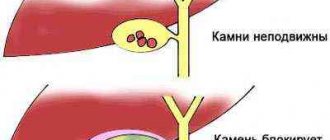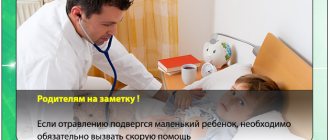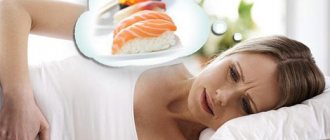The occurrence of one painful manifestation is unlikely to indicate systemic disturbances in the functioning of the body. An attack of nausea may occur from errors in nutrition or ordinary overeating. But the simultaneous combination of several unpleasant symptoms should definitely alert a person. If you experience nausea, chills with fever and a stomach ache, weakness is felt throughout the body, you should not self-medicate.
- Prevention measures
Such physiological abnormalities may indicate the development of a serious pathology. The causes of abdominal pain and nausea can be determined through appropriate diagnostics, so there is no need to postpone a visit to the doctor.
Why the lower abdomen feels tight after menstruation: the main causes of pain
About menstruation
18.04.2018
23.5 thousand
15.8 thousand
4 min.
If your period has already passed, but the nagging sensation in the lower abdomen is still bothersome, this is cause for concern. Minor periodic pain may indicate a chronic inflammatory process, an infectious disease, or hormonal changes.
If a woman is bothered not only by discomfort in the lower abdomen, but also by aching pain in the lower back and legs, weakness, causeless mood swings, menstrual irregularities, pathological bleeding during and between menstruation, all this is a reason to consult a specialist.
There are many reasons for pain after the end of menstruation. They may be physiologically determined or indicate the development of pathology.
Natural (physiological) reasons:
- 1. Ovulation.
- 2. Pregnancy.
If a girl has a tightening in the lower abdomen after menstruation, mainly on the left or right, 7-12 days after the end of menstruation, this may mean the beginning of ovulation. To confirm this, it is enough to purchase the appropriate test at the pharmacy.
This condition is normal only if the pain is not severe.
If a pulling sensation in the lower abdomen occurs after menstruation has ended - in the middle or at the end of the menstrual cycle - this is often a physiological sign of pregnancy. The condition is also accompanied by symptoms such as:
- 1. Dizziness.
- 2. Periodic nausea.
- 3. Soreness of the breasts and nipples.
It is especially typical during pregnancy if a girl feels sick in the morning for no apparent reason and this is combined with pain in the lower abdomen. To confirm conception, you need to take a pregnancy test or, for a more accurate diagnosis, do an ultrasound.
During the period of bearing a child, pain in the lower abdomen is associated with increased blood circulation in the reproductive organs and stretching of the uterine ligaments, which stretch along with the growing uterus.
During pregnancy, the growing uterus puts pressure on surrounding organs and this leads to nagging pain.
During the normal course of pregnancy, discomfort does not appear constantly, and to reduce pain, a woman just needs to take a horizontal position and relax.
But increased pain on one or both sides, the presence of copious or spotting pink or brown discharge, and deterioration in general health are alarming signs. They are caused by a frozen or ectopic pregnancy, or a threatened miscarriage. The presence of such symptoms requires urgent seeking help from a doctor.
If the pregnancy and ovulation test is negative, and pain in the abdomen and lower back continues to bother you, this often indicates the development of a disease or inflammatory process in the body.
Most often this is:
- 1. Inflammatory lesions of the pelvic organs.
- 2. Primary algodismenorrhea.
- 3. Problems related to the gastrointestinal tract and digestion.
- 4. Hormonal disorders.
- 5. Sexually transmitted infections.
- 6. Diseases of the urinary system.
Inflammatory pathologies in the pelvic organs include a group of diseases, which largely includes pathology of the uterus and its appendages. These include:
- 1. Endometritis is a pathology characterized by inflammatory damage to the inner (mucous) lining of the uterus.
- 2. Salpingitis – inflammation of the fallopian tubes.
- 3. Oophoritis – damage to the ovary.
- 4. Myometritis – inflammatory processes in the myometrium (muscular layer of the uterus).
- 5. Adnexitis - simultaneous damage to the fallopian tubes and ovary.
- 6. Cervicitis is an inflammatory process in the mucous membrane of the cervix.
- 7. Vulvitis – damage to the mucous membrane of the external genitalia.
The cause of the development of these diseases are viruses, fungi, protozoan microorganisms and bacteria that have penetrated the genital tract. The occurrence of diseases is promoted by:
- promiscuity;
- use of intrauterine devices;
- presence of latent infection;
- excessive physical activity;
- failure to comply with personal hygiene rules.
This disease is most often observed in girls and young women. It manifests itself in the form of very painful and irregular menstruation. The disease is caused by functional disorders of the autonomic, endocrine or nervous systems.
The mechanism of pain symptoms is associated with increased production of the sex hormone prostaglandin, which increases the sensitivity of pain receptors and causes spasmodic contractions in the uterus. Most often, primary algomenorrhea resolves after childbirth or spontaneously after several years.
The cause of pain can be such common problems as:
- stomach diseases (gastritis);
- increased flatulence;
- stool retention.
Pain in the lower abdomen often indicates more serious pathologies, including:
- circulatory disorders in the pelvic and intestinal organs;
- torsion of intestinal loops;
- exacerbation of peptic ulcer;
- perforation of the wall of the stomach or intestine and resulting bleeding.
The severity of the condition in these situations depends on the speed of medical care.
Acute local pain in the iliac region on the right side is the first sign of appendicitis. To provide timely assistance and prevent complications of the disease, you must immediately consult a doctor!
If a woman’s lower abdomen feels tight, this may indicate endocrine pathologies such as ovarian hyperfunction and thyroid dysfunction.
Most often this is caused by taking an incorrectly selected dosage and regimen of hormonal contraceptives.
This group of diseases, in addition to painful sensations, is characterized by the fact that a woman is bothered by purulent, foamy, profuse discharge from the genitals, burning and itching during urination or sexual intercourse.
This pathology can be confirmed by conducting a bacteriological examination of a smear from the genital organs.
They are accompanied not only by abdominal pain, but also by painful and frequent urination, lower back pain, and blood in the urine.
In the diagnosis of this group of diseases, a routine urine test plays an important role; with its help, you can correctly identify the disease and prescribe appropriate therapy.
Every woman should carefully monitor her health, and even if there is minor pain that bothers and disrupts her usual way of life, she should immediately consult a doctor. Self-medication will only aggravate or aggravate the course of the disease.
Source: https://fraumed.net/menstruation/about-menstruation/tyanet-niz-zhivota-posle-mesyachnyx.html
What can cause stomach pain?
Localization of pain syndrome
In order to fully understand the question of why the stomach hurts, it is necessary to clarify the location of the discomfort. When visiting a doctor, such an anamnesis will allow the specialist to understand what type of diagnosis to use first.
1. If your stomach hurts when you inhale and gets worse during movement, this indicates a disorder in the spinal nerves. Most often the pain is concentrated in one place. In this case, you will need the help of a gastroenterologist and neurologist.
2. In the upper area on the right side - disease of the liver, biliary tract, pancreas and others.
3. Colic in the abdomen on the upper left side indicates an ailment of the stomach, colon and kidneys.
4. If there is discomfort in the lower abdomen, then this indicates dysfunction of the reproductive system.
5. When the stomach hurts on the lower right side, then 85% is appendicitis.
To independently determine the exact location, you need to lie on your back. Relax, rub your hands and place your palm where it hurts. Using gentle movements, use your fingertips to explore the entire area. Apply gentle pressure and note where the pain is localized and where it radiates in the stomach. The discomfort can be local and radiate down to the lower back, thoracic region, or stabbing in the side. Pay attention to additional symptoms - vomiting, feces, nausea, and so on.
After palpation, previous events should be recalled. In rare cases, an attack appears on its own. Almost always something stimulated him: physical activity, psycho-emotional state, consumption of food or alcoholic beverages. Record how much time has passed, and how the illness behaved all this time - in increments, spasms, or the malaise arose suddenly.
The pain can be periodic or constant, of varying intensity, as well as pulling, aching and squeezing the entire inside - all these factors are taken into account when making a diagnosis. It is impossible to independently identify the disease with 100% probability.
Time to see a doctor
A specialist who will help establish the correct diagnosis of illness and prescribe treatment is a gastroenterologist. In some cases, consultation with a surgeon and neurologist will be required.
If your stomach hurts for more than two weeks, and the attacks are episodic, then ambulance is necessary in the following cases:
- temperature, a previously established diagnosis of jaundice, dark urine, nausea, and light-colored stool in the form of a paste;
- sharp pain syndrome, accompanied by bleeding from the uterus; there was previously a disruption in menstruation;
- after injury;
- the malaise does not go away for more than three hours;
- hunger pains accompany a person every day.
You need to urgently call an ambulance if:
1. The attack occurs against the background of bleeding from the mouth or vomiting of “red coffee grounds.”
2. The person is dizzy, has fainted, is confused, the pulse is rapid, and the skin is cold and sticky.
Remember that you should not prolong or ignore stomach discomfort, as this will lead to irreversible consequences.
Pulling in the lower abdomen after menstruation: pregnancy or pathology
The female body is a harmonious system influenced by hormones and their combinations. All the changes happening to her are aimed at fulfilling the most important mission - the birth of a new life. At the slightest “breakdown,” the body lets you know with pain or unpleasant sensations. That is why, if the lower abdomen feels tight after menstruation, then you need to pay attention to it.
Changes in the cycle
First, let's remember what happens in the female reproductive system during the menstrual cycle.
The onset of menstruation is the first day of the cycle. Bloody discharge indicates renewal of the inner layer of the uterus - the endometrium, in response to the death of an unfertilized egg.
Due to the absence of pregnancy, the concentration of progesterone and estrogen drops sharply, which causes spasm of endometrial vessels and the release of prostaglandins, which provoke uterine contractions.
All this causes spotting and pain in the lower abdomen during menstruation.
Simultaneously with menstruation, the follicular phase begins, during which all changes are aimed at the maturation of the follicle with a new egg.
At this time, the concentration of follicle-stimulating and luteinizing hormones gradually increases.
By days 12–14 of the cycle, ovulation occurs: the mature follicle will burst and the egg, ready for fertilization, will leave the ovary and move through the fallopian tubes into the organ cavity.
Three days later, under the influence of luteinizing hormone, the maturation of the corpus luteum begins at the site of the ruptured follicle. If a girl becomes pregnant, it is this temporary organ that will synthesize pregnancy hormones until the placenta is formed. If the meeting of the egg and sperm does not occur, the corpus luteum atrophies and the cycle repeats.
Physiological causes of pain in the lower abdomen at the end of menstruation
Most often, pain in the lower abdomen accompanies the first 1–3 days of menstruation itself. However, it happens that as a result of hormonal changes in girls with a low pain threshold, the stomach hurts both at the end of menstruation and for several days after it.
If the pain is not accompanied by a cycle disorder, does not cause much discomfort, is not associated with other pathological discharge, lasts no more than 3 days after the end of menstruation and goes away on its own, there is no reason to worry.
Try to get more rest and do light exercise regularly.
For some representatives of the fair sex, ovulation does not fit into book standards and occurs not on days 12–14, but earlier, from days 6 to 10 of the cycle.
During this natural process, due to the rupture of the follicle, a small amount of blood enters the pelvic cavity, which irritates the peritoneum.
Early ovulation is the reason why the lower abdomen and lower back hurt after menstruation.
If such pain in the left or right side lasts no more than two to three days and is not accompanied by pathological signs (bleeding, weakness, lethargy, dizziness, loss of appetite, low blood pressure), you can rest easy.
Beginning of pregnancy
If you have early ovulation and your lower abdomen ache 10–14 days after your period, you should think about the possibility of pregnancy. It is on these days that the fertilized egg may attach to the wall of the uterus.
A woman may feel, in addition to nagging pain, slight weakness and observe short-term, small-volume bleeding for 1–3 days (implantation bleeding).
Sometimes, with an unstable cycle, during the last scanty menstruation a girl experiences just implantation bleeding, then after that the stomach will also hurt due to pregnancy.
If you feel pain in your lower abdomen immediately after your period, this may be the beginning of pregnancy. You need to use a test (modern technologies make them hypersensitive and capable of detecting the onset of gestation at the earliest stages). You can donate blood to determine the concentration of human chorionic gonadotropin (hCG) in a antenatal clinic.
Read about whether it is possible to be pregnant during menstruation and how to distinguish true menstruation.
Intrauterine device
During menstruation, the cervix opens slightly to ensure the normal course of the process. Against this background, the location of the IUD may change, which provokes pain. It usually does not require medical attention and goes away on its own.
Taking hormonal contraceptives
At the very beginning of taking oral contraceptives, the lower abdomen may ache due to hormonal changes in the body. The pills are started when the previous cycle ends.
Typically, pain in the abdominal area is temporary, not very intense and goes away on its own. However, it should be remembered that COCs can cause miscarriage if pregnancy occurs.
Therefore, the use of these drugs should always be coordinated with a gynecologist.
Source: https://MesyachnyeDni.ru/menstruaciya/tyanet-niz-zhivota-posle-mesyachnyh.html
Treatment methods
First you need to try traditional methods of treatment. If such methods are ineffective, you should switch to drug treatment.
You should start with yoga. Cobra pose is perfect for relieving abdominal pain. Lower yourself face down to floor level. Slowly raise your head and chest. All this is done without hands. Next, using your hands, continue to slowly raise your head and chest until you begin to feel a slight tingling in your back. This should be accompanied by abduction of the head. At the same time, breathe as follows: inhale when you raise your body, exhale when you lower your body. Perform the exercise no more than three times, each exercise should last 4-5 minutes.
The next yoga pose that can help you is called the bow. Lower your face down. Bend your knees and lift them up. Squeeze your ankles with your hands.
The pain also quickly disappears during the systematic use of oral contraceptives. The fact is that oral contraceptives often have a therapeutic effect. To choose the right oral contraceptive from a wide range, you need to consult a gynecologist and undergo the necessary tests.
Other medications that may help include muscle relaxants, anti-spasm medications, and pain relievers. The painkillers that are sold without a doctor's prescription are suitable for you. Herbal tea with valerian solution can also help. He will calm you down and relax you. When you experience pain like this, you need to take a day off and stay in bed.
Why is my period over and my lower abdomen feels tight?
Mild discomfort during the menstrual period is considered normal. Abdominal pain may appear before menstruation and last for several more days.
But it also happens that your period has passed and your lower abdomen feels tight. You cannot ignore the uncomfortable sensation, as it can signal that the body is not working properly. However, before taking painkillers, you need to figure out why your stomach continues to bother you after your period ends.
After menstruation, stomach ache: possible causes
If your stomach hurts for some time after your period, the reasons for this phenomenon can be very different. Moreover, discomfort is not always associated with gynecological diseases.
The most harmless factor is bloating and constipation. Gastrointestinal problems can be transmitted to the uterus, and abdominal pain will vary. A consultation with a gastroenterologist or an effective drug for flatulence and other digestive disorders will help get rid of the symptom.
Abortion
After an abortion or spontaneous miscarriage, abdominal pain after menstruation will persist for several cycles.
You need to listen carefully to how you feel, because inflammation can develop in the genital tract. It is dangerous to self-medicate; it is better to consult a specialist.
Ovulation
If the spotting stopped 7-10 days ago and a pulling sensation appears in the abdomen again, the symptom may indicate the beginning of ovulation. The process of releasing a mature egg occurs after menstruation and the woman feels that she is pulling in her lower abdomen and lower back.
Discomfort is associated with rupture of the follicle. Sometimes during ovulation a small amount of blood comes out of the genital tract. For many women, the ovulatory phase is asymptomatic. But if the time of ovulation approaches according to the menstrual calendar and your stomach begins to ache, this is normal.
Inflammatory diseases of the uterus and appendages
As a rule, gynecological diseases are accompanied by severe symptoms. For example, with adnexitis, the appendages become inflamed and adhesions form in the tubes. Patients complain of the following symptoms:
- Bad feeling.
- Temperature increase.
- Unusual discharge from the genital tract.
- There is a pulling in the lower abdomen and nausea, even if your period has long ended.
With vulvitis, the mucous membrane of the external genitalia becomes inflamed. Fungal and other infections may develop against the background of this disease. Symptoms of vulvitis are not limited to abdominal pain. These are accompanied by burning and itching in the intimate area, swelling of the labia and purulent discharge.
Endometriosis is a disease of the uterus in which the lining of the uterus grows to such an extent that it extends beyond the cavity and envelops other organs and tissues. The pathological process may be asymptomatic. Obvious signs of endometriosis are manifested by dark discharge with clots and pain during bowel movements and bladder, as well as during sexual intercourse.
In the early stages of pregnancy, a woman's period may be replaced by bleeding when the fertilized egg attaches to the uterus. Scanty discharge and nagging abdominal pain after bleeding are signs of pregnancy. If the child is desired, you need to contact a gynecologist, undergo an examination and register.
Tumors on the ovaries
If you periodically feel tightness in your lower abdomen after your period, it is possible that a tumor is developing on the ovary. A kind of liquid bubble can reach large sizes. The cause of the nagging pain lies in the pressure that the bubble exerts on neighboring organs.
In addition, overstretching of the ovary is possible. If the tumor is benign, it may be functional. The cyst will resolve on its own in a few months.
A malignant tumor grows gradually. Discomfort in the abdomen is felt for several cycles.
Show hidden content
Myoma and polyposis
A fibroid or polyp may form in the uterine cavity. A polyp can also form in the cervical canal.
If your stomach hurts acutely after the end of your period, and there was intense bleeding on your menstrual periods, most likely the discomfort is caused by a neoplasm.
: Submucosal fibroid and polyp
Infections in the genital tract
It happens that your period has passed, but your stomach still hurts. Vaginal discharge has a yellowish tint and an unpleasant odor. The unusual nature of the discharge and pulling sensations are signs of an untreated sexually transmitted infection.
The symptoms are explained by inflammation and enlargement of the affected organ. Discomfort increases with intimate relations and active movement. Without treatment, the process becomes chronic, the clinical picture blurs. Getting rid of a chronic illness is difficult.
In young nulliparous girls, painful and pulling sensations in the lower abdomen after menstruation may be associated with the structural features of the internal genital organs. Typically, discomfort intensifies during menstrual periods and disappears by the middle of the cycle. After childbirth, physiological pain goes away on its own.
Pain in the uterus after menstruation
When, for some reason, the uterus hurts after menstruation, a woman thinks that her stomach just hurts. Pathology has different explanations:
- Incorrect location of the reproductive organ.
- High estrogen levels.
- Hormonal disorders.
- There is a contraceptive device in the uterine cavity.
It has been noticed that pain appears due to insomnia, stress, anxiety, and psycho-emotional tension. For timely diagnosis of pathology, you should consult a doctor as soon as possible with complaints and differentiate it from diseases not related to menstrual function.
Why does your stomach ache if you don’t take into account your periods?
- Gastritis.
- Stones in the kidneys.
- Worm infestation.
- Appendicitis.
- Stomach ulcer.
- Inflammatory processes in the kidneys and gall bladder.
- Diseases of the duodenum.
You should also take into account the fact that after childbirth, women experience lochia - bloody discharge. They are not menstrual periods. This is a cleansing of the uterus of a different nature. In some cases, lochia is accompanied by pain. As lactation ends, real periods begin. While the cycle is being restored, the woman feels abdominal pain.
Reason to urgently consult a doctor
Painful and nagging sensations after the end of menstruation take on a different character - it all depends on the individual characteristics of the body. To reliably assess the patient’s condition, the doctor takes an anamnesis and begins an examination.
A woman can describe pain in these words:
- Regular or periodic.
- Weak, strong, moderate.
- Sharp, dull.
- Pulling, stitching, aching, spastic.
- Occurring for no reason or under the influence of trauma, anxiety, overwork, intimacy.
Be that as it may, pain itself is not the norm for a healthy body and requires medical intervention. A woman should immediately contact a gynecologist if she not only feels pain in her lower abdomen after menstruation, but also has the following warning symptoms:
- Stable hyperthermia.
- After menstruation, the breasts swell.
- White or clear discharge comes out of the nipples.
- Foul-smelling, opaque discharge from the genital tract.
- Discomfort increases in the postpartum period.
If the doctor has not discovered a serious pathology, the development of which provokes discomfort, a woman can use folk remedies to ease her well-being. Herbal infusions of lemon balm, thyme, St. John's wort, and chamomile will help overcome pain. Honey and lemon are added to tea. You can prepare a healing drink from dry wild strawberry leaves.
After drinking, you can wrap your stomach area with a warm scarf and put thick socks on your feet. Lifting weights on days when your stomach hurts is not recommended. You can also brew wormwood herb with boiling water (1 tsp per 200 ml). Healers recommend drinking the bitter infusion 2 times a day, 100 ml.
If you don’t have time to prepare decoctions and infusions, you can relieve pain with No-shpa, Tempalgin, Spasmolgon and other drugs. If the nature of the pain is psychological, it is enough to reconsider the daily routine and allocate more hours for rest and walks. After all, sometimes it is not illness that worsens health, but a banal lack of fresh air and movement.
Source: https://MenCikl.ru/tyanet-niz-zhivota-posle-mesyachnyx.html
Recommendations
Various reasons lead to abdominal pain after menstruation. These may be both gynecological and non-gynecological factors. In any case, it is necessary to pay due attention to the situation, search for the right methods to eliminate pain, and undergo treatment to prevent complications. Remember that you need to seek help from a specialist when the pain does not go away for a long time or does not stop for several hours, and in some cases even intensifies. Do not forget that taking painkillers only relieves pain, but does not provide treatment. Look for the causes and eliminate them with the help of a qualified specialist.
A nagging pain in the lower abdomen during menstruation is a common monthly sensation for most women, but what to do if such unpleasant symptoms appear when the menstrual days have long passed.
In this article, we will look at the main reasons why a woman’s lower abdomen hurts after menstruation, when it is a natural symptom, and if there are any signs, you should immediately seek help from a specialist.
Nausea after menstruation: what could it be, the main reasons
During menstruation, the girl experiences discomfort. The cycle lasts one to six days, depending on the individual characteristics of the body and external circumstances.
The unfertilized egg is rejected by the body and the lining of the uterus separates, causing bleeding. Women keep a monthly calendar, anticipating the onset of an unpleasant period.
Hormonal changes during menstruation are a natural process. You can avoid the onset of critical days during pregnancy and lactation.
Changes in a woman's body
The inconveniences experienced by female representatives during menstruation interfere with the normal flow of life. Loss of strength, malaise, and capricious mood are closely associated with hormonal fluctuations. Girls experience temporary difficulties with symptoms accompanying menstruation:
- Dizziness (associated with low blood pressure);
- Nausea (release of hormonal enzymes into the blood);
- Swelling of the mammary glands and abdomen;
- Increase, decrease in body temperature;
- Rashes on the skin of the face, neck, shoulders;
- Headache.
Additional unpleasant phenomena during menstruation
A failure in the body’s systems does not pose a threat to the girl’s health; the hormonal levels are restored over time. What can prevent you from leading a normal rhythm of life during an inevitable period for a woman:
- Stomach upset;
- Problems with stool;
- A nagging pain appeared in the lower back and abdomen;
- Decreased appetite;
- Attacks of nausea, possibly vomiting;
- Irritability, decreased activity;
- Brown, whitish discharge.
Menstruation is associated with the production of prostaglandin. The hormone affects muscle fibers and the circulatory system. Blood clotting decreases, muscles are toned.
Prostaglandin spasms the uterus, the girl feels sick. The substance affects the nervous system, causing pain in the lower abdomen and a gag reflex.
The body experiences severe dizziness, swelling of the legs and other troubles.
Nulliparous girls are more often susceptible to the negative influences of hormones. The state of the body is affected by the structure and deviation of the uterus from the norm. The individual characteristics of the organ upset the balance of progesterone, estrogen and prostaglandin. After childbirth, nausea and vomiting during menstruation disappear.
Severe discomfort during and after menstruation
What should a woman do to relieve nagging pain and maintain balance? In a week, your period will pass, relatives and colleagues will be impressed by the emotional behavior of a woman experiencing the “beauty” of the natural process.
During menstruation, you should not set sports records or subject your body to physical activity. Sudden movements aggravate the natural process. The girl feels dizzy and her vision darkens. The rhythm of life does not allow Russian women to relax, to take a quiet walk in the fresh air, taking a break from the hustle and bustle. Weakness and nausea are the result of constant haste.
Often, the girl herself has a hand in the accompanying signs of menstruation, abuses junk food, bad habits, or carries weights, provoking pain. It is prudent to limit excesses in nutrition. Choose healthy foods that contain fiber and healthy nutrients.
Eating salty, spicy foods disrupts water-salt metabolism. The body becomes dehydrated, requiring replenishment of water. Excess moisture in tissues and organs leads to edema and increased blood pressure. As a result, the head becomes heavy and hurts.
A female representative faints.
Nausea after menstruation
If nausea does not subside a week after the bleeding stops, the girl needs to think about nutrition, the amount of fluid consumed before and during menstruation, work and rest schedule.
A woman does not experience joy when her critical days coincide with national and state holidays. The diet is getting out of control, the girl indulges in excess on a holiday.
There may be independent reasons in the life of ladies.
What leads to nausea after your period ends?
- Stressful situations. Moral burnout associated with stress at work and family circumstances is tiring. Nervous feelings, anxiety and difficulties in relationships cause nausea and headaches. Vomiting occurs.
- Oral contraceptives. Incorrectly selected hormonal medication has a side effect – nausea after menstruation. Taking the drug (starting taking it) coincides with the end of menstruation. The nauseating state is accompanied by headaches, aggressiveness, and indigestion.
- Pregnancy. The situation is ambiguous. The woman decides whether to enjoy the event or not. Rarely does a woman think about the signs of pregnancy when her period appears at the expected time and ends on time. Sometimes the situation is associated with slight bleeding in the early stages, strongly reminiscent of menstrual flow. The woman decides what to do next after consulting a doctor.
- Deviation of the uterus. The location of the uterus does not threaten the girl’s health and future motherhood. But it provokes nausea after menstruation. The uterus is enlarged, pressing on neighboring organs and nerve endings. These impulses cause physiological discomfort; a woman may have pain in the lower back, stomach or head. The pain goes away over time.
How to deal with nausea after your period
It is better to remain calm and wait for the body to regain strength. If the cause of unpleasant health is not external circumstances, then the natural processes of the body will soon return to normal. Provoking factors are eliminated to help the body cope with the load. Nervous shocks, exercise and rich food can wait.
A girl who is interested in yoga and gymnastics will bypass the malaise. Spiritual practices will bring comfort and peace to the psychological state.
Physical relaxation during menstruation and when menstruation ends normalizes the functioning of the genitourinary and circulatory system. To relieve headaches and nausea, take a pill approved by your doctor.
No-spa and spasmalgon will help relieve spasms. Nerve cells are calmed by herbal infusions (melissa, chamomile, valerian).
Why do women suffer?
Monthly blood loss makes women experience discomfort. The menstrual cycle is the first process from which a woman cannot escape. Tolerating unpleasant sensations is not a pleasant pleasure, so escape routes are prepared in advance. If you properly tune in to the physiological test, then the woman will easily endure minor changes in the body.
In order for a lady to remain in high spirits and maintain her ability to work, she should follow simple rules and not abuse rich food, alcohol, or harmful foods. This will not require spending any money.
Will set you up for the upcoming period with moral preparation. If maintaining a healthy lifestyle does not help prevent nausea, you should seek the help of a doctor.
A possible disease occurs in a latent form, diagnosis is half the success.
If nausea and vomiting after menstruation signal an imminent addition to the family, then the disease has nothing to do with it. It's time to accept congratulations.
Source: https://GastroTract.ru/simptom/toshnit/posle-mesyachnyh.html
Ways to relieve and treat pain
If the lower abdomen feels tight after menstruation, only the attending physician can determine the exact cause of this discomfort and prescribe appropriate treatment, but a woman can alleviate the condition on her own and at home. To do this, she needs to follow simple recommendations:
- you need to wear warm socks and try not to overcool your feet;
- you should reduce physical activity and spend more time in a horizontal position;
- you should take walks in the fresh air more often and get more positive emotions, try to be less nervous and avoid stress;
- If the doctor has not detected any pathology, you should drink more water and herbal teas; teas that include chamomile, lemon balm and St. John's wort are suitable for this. Honey and lemon will give the tea an additional effect;
- you can drink tea from strawberry leaves;
- An infusion of wormwood will help relieve stomach pain; to prepare it, you need to pour a teaspoon of dry herb into a glass of boiling water and drink half a glass twice a day.
These are only temporary measures to help reduce discomfort from pain in the lower abdomen; if after using them the condition does not improve, you should urgently seek help from a specialist. First, the doctor conducts a full examination, including general blood tests, smears for flora, ultrasound of the pelvic organs, etc. Depending on the diagnosis, treatment may include anti-inflammatory, antibacterial or hormonal therapy, or surgery. If there are no pathological causes, the doctor may recommend that the woman practice yoga to strengthen and stretch the abdominal muscles.
Lower abdomen hurts and nausea after menstruation and
During menstruation, the girl experiences discomfort. The cycle lasts one to six days, depending on the individual characteristics of the body and external circumstances.
The unfertilized egg is rejected by the body and the lining of the uterus separates, causing bleeding. Women keep a monthly calendar, anticipating the onset of an unpleasant period.
Hormonal changes during menstruation are a natural process. You can avoid the onset of critical days during pregnancy and lactation.
